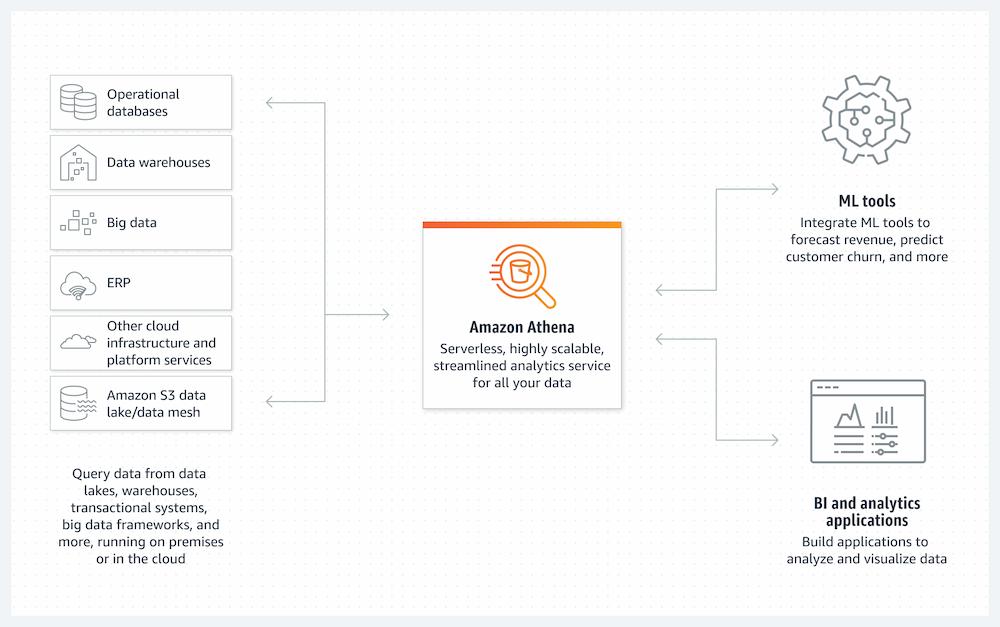Amazon Web Services (AWS) Athena is a query service that allows you to analyze data stored in Amazon S3 using standard SQL queries. This powerful tool makes it easy to run ad-hoc queries on large amounts of data without the need for complex ETL processes, dedicated infrastructure, or specialized skills. In this overview, we’ll take a closer look at how AWS Athena works and the benefits it offers for data analysis.
Table of Contents
Understanding AWS Athena
AWS Athena is a serverless interactive query service that allows users to analyze data directly in Amazon Simple Storage Service (S3). It eliminates the need for complex and expensive data warehousing systems, as well as the time-consuming process of loading data into a database. With Athena, you can simply create a table to define the schema for your data, and then start querying immediately. This means that you can analyze your data quickly and easily, without having to wait for hours or days for results.

Analyzing Data in Amazon S3 Using SQL with AWS Athena
AWS Athena is a powerful tool that can enhance your data analysis capabilities. With its ability to query unstructured, semi-structured, and structured data sets without the need for infrastructure setup or management, you can get started with your analysis right away. This means you no longer have to wait for hours or days to load data into a database for analysis.
Moreover, deploying Athena is cost-effective as it eliminates the need for complex and expensive data warehousing systems. With Athena’s standard SQL support, querying data stored in Amazon S3 has never been easier!
How to Use AWS Athena
Using AWS Athena can significantly improve your data analysis capabilities. To get started, you first need to create a table or database in Amazon S3 where you store and manage your data. Once this is done, you can use Athena to run SQL queries on that data, without the need for any additional setup or configuration. You simply specify the location of your data in Amazon S3 and start querying it using the familiar SQL syntax.
This makes it easy for users who are already experienced with SQL to start using Athena right away, without investing time and resources into learning a new tool or programming language. As you continue to use Athena, you can refine your queries and optimize them according to your specific needs, which helps you achieve better results in less time.
Overall, using AWS Athena is a cost-effective, scalable, and agile way to enhance your data analysis game and stay ahead of the competition in today’s fast-paced business world.
When to use AWS Athena
- When you have large amounts of data stored in Amazon S3 and need to perform ad hoc analysis on it.
- When you don’t want to manage infrastructure and resources to run queries on your data. Athena is serverless, so you don’t have to worry about capacity planning, configuring servers, or managing software updates.
- When you need to analyze different types of data such as CSV, JSON, ORC, or Parquet files.
- When you want to use standard SQL to query your data without having to learn a new query language or write custom code.
- When you want to pay only for the queries you run and not for the resources you provision.
The Benefits of AWS Athena
Serverless
AWS Athena is a serverless service, which means that you don’t have to worry about provisioning or managing servers, software updates, or capacity planning. This can save you a lot of time and effort.
Scalability
AWS Athena is designed to be highly scalable. It can automatically scale to handle any amount of data, so you don’t have to worry about running out of resources when querying large datasets.
Integration
AWS Athena integrates with other AWS services, such as Amazon S3, AWS Glue, and Amazon QuickSight, which can help streamline your data analysis workflow.
Standard SQL
AWS Athena uses standard SQL, so you don’t have to learn a new query language or write custom code to analyze your data. This makes it easy to get started with and use.
Pay-per-use
With AWS Athena, you only pay for the queries you run, which can help you save money on infrastructure costs. There are no upfront costs or minimum fees.
Variety of data formats
AWS Athena supports a variety of data formats, including CSV, JSON, ORC, and Parquet, which makes it easier to work with different types of data.
Advanced Features of AWS Athena
Serverless Architecture
AWS Athena is built on a serverless architecture, meaning there’s no need for provisioning or managing infrastructure. This simplifies the process of analyzing large-scale data sets.
Integration with AWS Glue
AWS Athena integrates seamlessly with AWS Glue, a fully managed extract, transform, and load (ETL) service. This integration allows for more sophisticated data catalogue features and automated schema recognition.
Support for Multiple Data Sources
Athena can analyze data not just from Amazon S3 but also from over 30 data sources, including on-premises data sources or other cloud systems.
Built on Open-Source Frameworks
Athena is built on open-source Trino and Presto engines and Apache Spark frameworks, offering flexibility and compatibility with a wide range of tools and technologies.
Limitations and Considerations of AWS Athena
Query Optimization
Athena’s optimization is limited to queries. Data already stored in Amazon S3 cannot be optimized, which might affect performance.
No Indexing Options
Athena lacks indexing options, which can increase the operation load and potentially affect performance.
Partitioning Requirements
Efficient querying in Athena requires data to be partitioned, and these partitions must be managed effectively.
Unsupported Features
Athena does not support certain features like stored procedures, parameterized queries, and Presto federated connectors. It also has limitations on row and column sizes and does not support querying data in S3 Glacier and S3 Glacier Deep Archive storage classes.
In Conclusion
In conclusion, Athena stands out as a robust and versatile query service, offering a range of advanced features such as serverless architecture, seamless integration with AWS Glue, support for multiple data sources, and a foundation built on open-source frameworks.
While it presents certain limitations like query-only optimization, lack of indexing options, partitioning requirements, and unsupported features, the benefits of using Athena for data analysis are substantial. Its ability to handle large-scale data sets with ease, coupled with its cost-effective and scalable nature, makes it an invaluable tool for organizations looking to harness the power of their data.
As the landscape of data analysis continues to evolve, Athena is poised to remain a key player, helping businesses unlock insights and drive informed decision-making.
Need Help Getting Started With AWS?
Cloudvisor is a 100% AWS-oriented company specializing in supporting startups in growing their business on AWS and helping them save each step of the way. With Cloudvisor, you can start saving anywhere from 10% to 40% of your current spending on Amazon Web Services. In addition, we provide Well-Architected Reviews, cost audits, AWS security services, migration to AWS, and DevOps services.






